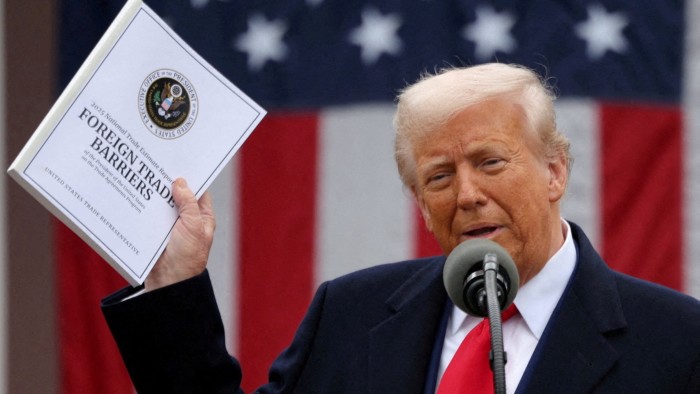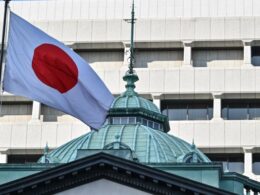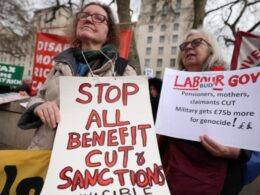Unlock the Editor’s Digest for free
Roula Khalaf, Editor of the FT, selects her favourite stories in this weekly newsletter.
In an early interview as US Treasury secretary back in February, Scott Bessent made it clear that bond yields, rather than stock prices, were the financial market metrics that he and President Donald Trump cared most about.
While he didn’t elaborate why, it’s not hard to guess. US bond yields set the price for new mortgages. They determine the price and availability of finance for most US company borrowing. And, perhaps most importantly to Trump, bond markets hold the purse strings to government.
Since the interview, US stocks have bombed — down 13 per cent by mid-morning on Friday in New York. Equity markets hate uncertainty and there has been no shortage of that since Donald Trump’s return to the White House. Tariff flip-flopping, public sector job cuts amid upheaval over government policy and a broader assault on multilateralism have cast a dark shadow over the economic outlook. But bond prices have risen, meaning that yields have dropped.
In the context of weaker global bond markets, this is impressive. British, French and German ten-year government bond yields have risen over the same period. American exceptionalism lives on in their bond market, if no longer across their newly-sagging equity indices.
Furthermore, this exceptionalism has occurred despite higher inflation expectations and an increasingly worrying debt trajectory — the traditional bogeymen of bond markets. Since Bessent’s interview, both private sector economists and markets alike have revised higher their forecasts for US inflation. And the nonpartisan Congressional Budget Office not only expects ever rising levels of federal debt, but has also increased its projected path of federal deficits.
Moreover, there has been much market chatter over a so-called Mar-a-Lago Accord involving what would effectively be a coercive exchange of Treasury bonds upon America’s allies. The idea was discussed in a report written by Stephen Miran before he became chair of Trump’s Council of Economic Advisors. When asked about the idea last week, Miran would only say that Trump’s focus was on tariffs. We don’t know how much of the $3.8tn of US Treasury holdings marked as foreign official holdings are owned by its allies, but talk of a debt exchange is unlikely to encourage them to add more.
And yet, despite rising inflation expectations, the government debt burden and the talk of a debt exchange, the US market has had no Liz Truss moment.
What explains the strength of US government bonds? Well, yield declines have been accompanied by the sort of news that administrations tend to fear and bond markets tend to relish: leading economic indicators have fallen off a cliff. This is because bad economic news tends to be a prelude to cuts in short-term interest rates, making existing bonds with higher yields more valuable. And they’re betting that a weak economy will overwhelm rising consumer prices in the Federal Reserve’s rate-setting calculus.
The collapse in leading indicators looks largely self-inflicted. So-called “soft data” series — such as surveys of consumer confidence and manufacturing purchasing managers — reflect heightened uncertainty about the economic outlook. Both central bankers and bond markets are watching closely for signs that harder economic data will begin to follow the softer data south.
In a note entitled “There will be blood” on Friday, JPMorgan raised its estimate of the risk of recession in the global economy this year to 60 per cent from 40 per cent if the tariff increases are maintained. Since Bessent’s February interview, the bond market has priced in almost three additional rate cuts by the Fed.
Given the dominant role of the dollar in global commerce, Treasury bonds also have a special place not only in global financial plumbing, but also on the balance sheets of the world’s governments and firms. This guarantees that, should the US economy slow sharply, the Fed can cut rates and the government can cover revenue shortfalls with additional bond issuance. And substantial demand for Treasuries will be forthcoming for as long as the US retains monetary hegemony.
Bond traders cannot imagine that the administration would be so reckless as to threaten the dollar’s reserve currency status by enacting the coercive exchange idea. Or at least they are unwilling to price it. Loss of this so-called exorbitant privilege would be devastating. Moreover, these losses would probably stretch far beyond American shores given the interconnectedness of the global financial system. So — perhaps ironically — investors seeking shelter from the damage being done by US tariffs continue to find it in its government’s bonds. At least for now.
“Wall Street, where you and I came from, has had it great”, Bessent told his interviewer. “Under this administration, it’s Main Street’s turn”. The bond markets are betting that the Trump administration is engaging in an act of economic self-harm. If it’s right, Main Street will have to wait.
Source link









